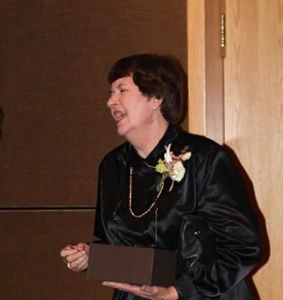(Revised 10/31/14)
 From thoughts on music to thoughts on life, Julianne Johnson recalls what she’s learned over her 43 years in the Utah Symphony as well as other orchestras she’s played in. She started the interview with one bit of clarification. “I guess this is about retirement, right?” she asked. Indeed, Julianne has put down her bow to pursue some aspects of her life that got pushed to the back burner over the years, maybe even international travel to serene and historic locations. She now welcomes the freedom to plan trips without being tied to a work schedule. Of course, if that gets old she’s always welcome back with the Symphony.
From thoughts on music to thoughts on life, Julianne Johnson recalls what she’s learned over her 43 years in the Utah Symphony as well as other orchestras she’s played in. She started the interview with one bit of clarification. “I guess this is about retirement, right?” she asked. Indeed, Julianne has put down her bow to pursue some aspects of her life that got pushed to the back burner over the years, maybe even international travel to serene and historic locations. She now welcomes the freedom to plan trips without being tied to a work schedule. Of course, if that gets old she’s always welcome back with the Symphony.
Knowing that Julianne speaks French, I asked her if she was planning a trip. She took the ball and ran with it. “Am I planning a trip to France? What a great idea! I just might. I think the countries that I enjoy the very most (although there are many more) are France, Germany (my father was born in Bavaria), Switzerland, and Austria, in no particular order. I really love the Alps–high mountains, with cows grazing in the meadows and lots of wildflowers and a few chalets spread around! And very narrow roads twisting around the hillsides. I’d love to lie down in the grass (where a cow hasn’t been), at the side of a brook, and listen to Mahler right there!”
Local adventure comes to mind too. She hopes for more trips to Jackson Hole and the family cabin, as well as some horseback riding with her nephew.
In her respite between adventures, Julianne loves to read and do needlepoint. She continues to work her way through the classics and is looking forward to Middlemarch by George Eliot. Regarding needlepoint, she has one project that she’s worked on, hit and miss, for almost two years. “See? I need more time!” she exclaims. She says needlepoint is the type of thing that is more easily bought than completed (100-400 stitches/square inch).
“Musical advice for new musicians? Oh-oh. Well, Eric, you asked, so here goes!” She talks about the importance of really listening to what your colleagues are playing while you are playing something different. “If your colleague who has the melody takes time and you (with an accompanying figure) don’t, you’ll end up ahead and then it’s awfully untogether, not to mention unmusical. (I know, duh! But I’ve heard this kind of thing.)” She emphasizes the importance of mentally subdividing at critical spots, “which is the principle of counting smaller units than the main beat, such as counting eighths when the main beat is quarters. Take the example of playing a very slow quarter-note triplet over two quarter beats. By subdividing you should know EXACTLY where the triplet notes fall mathematically vis-a-vis the two quarter notes. Don’t just try to ‘feel’ it. Same with the exceedingly common dotted 8th-16th note rhythm. (The 16th is often rushed, believe it or not.)”
She alludes to Maurice Abravanel as she mentions how “he preached that we should be able to make a big long crescendo without getting faster. Automatically pushing the tempo sounds very amateurish. Holding steady provides tremendous strength when that’s what’s called for.”
I moved beyond music by asking Julianne for advice on life. She said, “1) Work hard at music but balance it by playing hard away from music too. 2) Absolutely stay away from drugs and other things that will harm you and those you love. It’s not worth it! 3) Love others and forgive them–we all need to be forgiven. Nobody’s perfect.”
-Eric Hopkins
